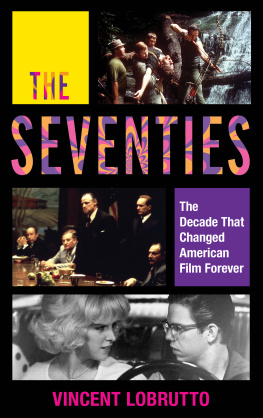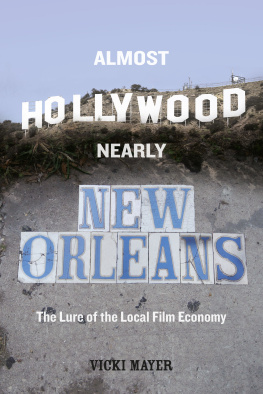MAIN
STREET
MOVIES
CINEMA AND THE AMERICAN EXPERIENCE
Kathryn H. Fuller Seeley, editor
Martin L. Johnson
MAIN
STREET
MOVIES
THE HISTORY OF LOCAL FILM
IN THE UNITED STATES

This book is a publication of
Indiana University Press
Office of Scholarly Publishing
Herman B Wells Library 350
1320 East 10th Street
Bloomington, Indiana 47405 USA
iupress.indiana.edu
2018 by Martin L. Johnson
All rights reserved
No part of this book may be reproduced or utilized in any form or by any means, electronic or mechanical, including photocopying and recording, or by any information storage and retrieval system, without permission in writing from the publisher.
The paper used in this publication meets the minimum requirements of the American National Standard for Information SciencesPermanence of Paper for Printed Library Materials, ANSI Z39.481992.
Manufactured in the United States of America
Cataloging information is available from the Library of Congress.
ISBN 978-0-253-03252-2 (cloth)
ISBN 978-0-253-03253-9 (paperback)
ISBN 978-0-253-03254-6 (ebook)
1 2 3 4 5 23 22 21 20 19 18
For my parents,
whose support is unwavering
This afternoon the populace of the city paraded in procession before that wonderful instrument, the moving picture machine. A momentary glimpse of the towns life on the streets was caught and fixed in preservation. The images of the scene, moving in the sunlight of a day that will be gone tomorrow, living and breathing, on the instant, was snatched from the grasp of time and sealed beyond the power of change, a silent fadeless pageant of what we were.
Now the crowds have scattered, and the people have returned to their homes and from the canvas of memory the transitory scene has already begun to fade.
The same grouping will not again occur. The same people can never assemble again. They themselves have changed in the short time. The school children have passed a little further on to adult life. The boys and girls are older and the aged have stepped nearer the grave. Those moving pictures of civic life which daily fill our streets and the streets themselves are changing. New houses will be built and others torn down; new children will come and the grim reaper will bind the ripened grain, but the picture on the reel which was made today will never change. It will come back and march in silent pageant, the horses prancing, the throng gesticulating, laughing, talking, cheering silently like the ghost of time.
These will be the real ghosts of the coon hunt. There will be no ghosts caught at the camp grounds as marvelous as these ghosts of ourselves. We will sit in the picture show hereafter and see ourselves living in the past, the resurrection of the past, and live again this day. And soon there will be some on the picture screen whom we once knew but know no more. The panorama of the world is passing. All creation is a moving picture. Beings on the far off worlds toward which the light is traveling from this one will see in ages yet to come our pictures when we have passed away, and perhaps when our spirits have winged their way to those celestial homes, flying swifter by angel flight than sunbeams go, we may arrive in time to see the pictures of our whole past life unroll before us like this reel today. If so, make the pictures now the way you want to see them.
The Pictures of Today,
Moberly (Mo.) Weekly Monitor, November 7, 1913
CONTENTS
ACCESSING MOVING IMAGES
Audiovisual materials are available for this volume. In the enhanced ebook these materials are embedded and can be viewed or listened to by clicking the play button. For readers of the print book, the collected materials are available for viewing online at http://purl.dlib.indiana.edu/iudl/media/197x61fm50. Information and links for each individual entry follow.
Moving Image 1.1. Excerpt from Present and Past in the Cradle of Dixie (1914). Directed by O. W. Lamb. Courtesy of the Alabama Department of Archives and History, Montgomery
http://purl.dlib.indiana.edu/iudl/media/b98m40zz0f
Moving Image 4.1. Excerpt from Wellstons Hero (1932). Directed by Don Newland. Courtesy of the Wellston Historical Association, Wellston, Ohio
http://purl.dlib.indiana.edu/iudl/media/435g355k07
Moving Image 5.1. Excerpt from Lincoln, Maine, Movie Queen (1935). Directed by Margaret Cram. Courtesy of Northeast Historic Film, Bucksport, Maine
http://purl.dlib.indiana.edu/iudl/media/v33r86cb22
Moving Image 6.1. Excerpt from Henderson, North Carolina, Movies of Local People (1938). Directed by H. Lee Waters. Courtesy of the H. Lee Waters Film Collection, David M. Rubenstein Rare Book and Manuscript Library, Duke University, Durham, N.C.
http://purl.dlib.indiana.edu/iudl/media/v63f95km9t
Moving Image 7.1. Excerpt from Mooresville, North Carolina, My Home Town (1946). Directed by Don G. Parisher and George S. Gullett. Courtesy of the Mooresville Public Library
http://purl.dlib.indiana.edu/iudl/media/722h247s71
Moving Image 8.1. Excerpt from Aliquippa in 1937 (1997). Produced by the Center for Industrial Heritage of Beaver County. Courtesy of Donald Inman
http://purl.dlib.indiana.edu/iudl/media/128n39z25v
ACKNOWLEDGMENTS
ACKNOWLEDGMENTS ARE GENEALOGICAL BY NATURE, interlocked intellectual and social histories of the author. Writing itself is a lonely endeavor, but one draws solace from the richness of scholarly engagement in classrooms and conferences, the warmth of family and friendship, and the joy of scaffolding new knowledge. While I have made every effort to thank people by name for their role in making this book possible, I also want to note that every person I have discussed local films with over the past decade has contributed to what you have in your hands today.
My undergraduate training in the Department of Modern Culture and Media at Brown University helped me realize the value of challenging dominant narratives of media history, and Wendy Chun, Michael Silverman, Elliot Colla, and Karl Schoonover helped me find my path as an academic and historian. This project germinated in 2003, when, in Robert C. Allens graduate seminar on the history of moviegoing in the United States, I first encountered the movies of H. Lee Waters, an itinerant filmmaker from North Carolina whose work remains as engaging as the day I first saw it at Duke Universitys Special Collections. At the University of North Carolina, where I completed a masters thesis on Waters, I benefited from Allens incisive commentary, as well as advice and mentorship from Robert Cantwell, Patricia Sawin, and, at Duke, Jane Gaines. At New York University, where I expanded my research into a dissertation, I added another roster of advisors and mentors, most notably Dan Streible, who, more than any scholar I know, has bridged divides between scholars and archivists, filmmakers and critics, bringing new vibrancy to film history, a field that for too long was stuck in the delta of Hollywood. Anna McCarthy, Jonathan Kahana, Dana Polan, the late Robert Sklar, and Moya Luckett also provided critical support for my project as it developed. My classmates, including Greg Zinman, Jinying Li, Dominic Gavin, Paul Grant, Jihoon Kim, Paul Fileri, Nate Brennan, Wyatt Phillips, Jennifer Zwarich, and David Parisi, were cheerful companions. Finally, I want to thank my colleagues in the Department of Media and Communication Studies at the Catholic University of America. I appreciate the generosity and thoughtfulness of Steve McKenna, Alex Russo, Niki Akhavan, Maura Ugarte, Josh Shepperd, and Abby Moser, who were always there to give advice as needed.
Next page



